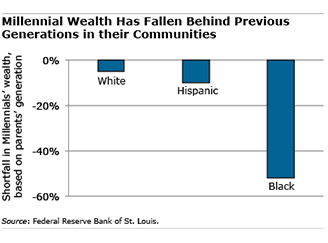
Black Millennials’ Wealth is Sliding

It’s still too early to assess the full impact of the COVID-19 downturn on Millennials’ economic fortunes. But Black Millennials had already lost a lot of ground before the pandemic hit their communities hard.
Their wealth in 2019 was just half of what would be expected based on how much wealth their parents’ generation had at the same age.
Other Millennials are also running behind previous generations, but only slightly. And their situations have improved in recent years, while Black Millennials are sliding farther and farther behind.
The Federal Reserve Bank of St. Louis called the situation “alarming” in its new report.
The oldest Millennials are turning 41 this year. But in 2019, the typical Black family born in the 1980s had only $5,000 in their savings accounts, 401(k)s, home equity and other wealth – compared with the roughly $11,000 they would be expected to have based on the previous generation. Hispanic Millennials had $22,000, and whites had $88,000.
Black Millennials are struggling for a few different reasons, said Ana Hernández Kent, a senior researcher for the St. Louis Fed’s Institute for Economic Equity. Homeownership is a major source of wealth for most Americans, but only a third of them own homes – half the rate of their white peers.
Student debt is another big issue, because African-Americans who borrowed money for college either didn’t graduate or used the loans to attend lower-quality for-profit colleges at disproportionate rates. Their college experiences haven’t always translated to earnings that are high enough to justify the debt taken on to pay for an education.
“They’re over-leveraged,” Kent said. “Just over a third of Black Millennials with at least a two-year degree are more likely to say the costs of college are larger than the benefits.”
In 2022, the Federal Reserve will follow up with a post-COVID-19 survey of U.S. finances. Kent is not feeling optimistic, given how Black Millennials are faring.
“I am concerned about these lower wealth Millennials who were struggling prior to the pandemic,” she said.
Squared Away writer Kim Blanton invites you to follow us on Twitter @SquaredAwayBC. To stay current on our blog, please join our free email list. You’ll receive just one email each week – with links to the two new posts for that week – when you sign up here. This blog is supported by the Center for Retirement Research at Boston College.
Comments are closed.







Any chance to see the statistics based on education — graduate school versus undergrad, versus community college, versus high school diploma?
Patrick- thanks for the question!
Unfortunately, the St. Louis Fed did not break down the findings by race and, within race, by education.
However, we do know college graduates generally earn more than people who don’t attend or finish college. Another Fed analysis of all Millennials, regardless of race, does show that Millennials with a college degree are in much better shape: https://www.stlouisfed.org/on-the-economy/2021/april/disparities-race-ethnicity-education-millennials-comeback-wealth